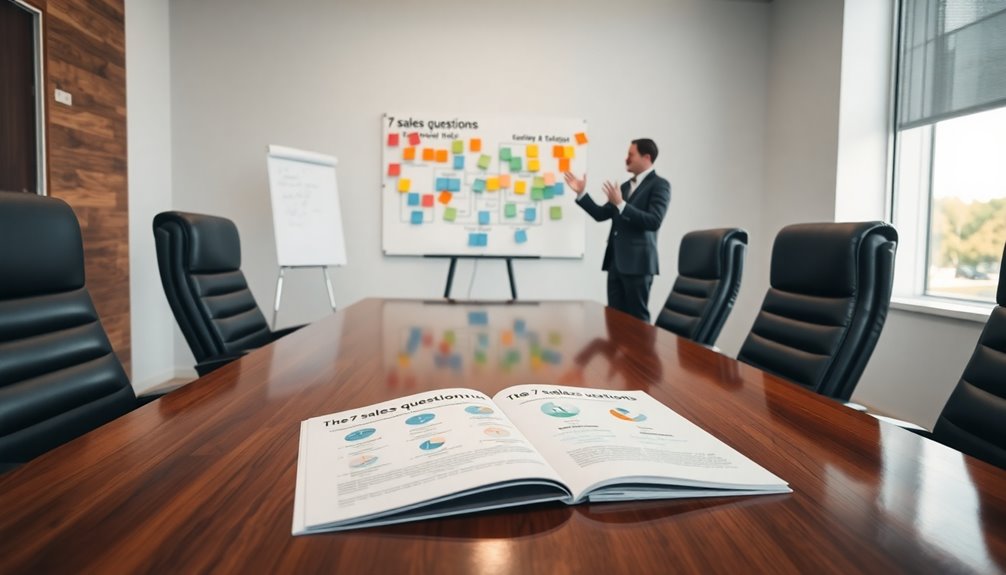To separate yourself as a top performer in sales, focus on these seven key strategies. First, communicate value clearly by understanding your customer's unique challenges. Master the art of asking insightful questions and practice active listening to engage effectively. Empathy is essential for building strong relationships. Utilize a proven sales methodology to streamline your approach. Build a high-caliber pipeline by prioritizing prospecting and nurturing leads. Stay open to coaching for continuous improvement. Finally, develop resilience to handle adversity and setbacks. Want to discover more about how these strategies can elevate your sales game? Keep exploring the insights!
Key Takeaways
- Top performers effectively communicate value by understanding customer challenges and tailoring solutions to meet specific needs.
- Mastering targeted questions and active listening fosters meaningful engagements and enhances understanding of buyer concerns.
- Building genuine relationships through empathy and trust leads to improved customer satisfaction and loyalty.
- A strong pipeline, focused on high-value targets, is vital for sustained sales success and effective prospecting.
- Openness to coaching and continuous self-improvement drives top performers to refine their skills and achieve greater success.
Communicate Value

Communicating value is essential for sales success, and top performers excel at it, scoring an impressive 7.6 out of 10. This effectiveness stems from their commitment to a value-based selling approach, where they focus on understanding the unique challenges each customer faces. By tailoring their communications, you enhance engagement during sales conversations, making it easier for clients to recognize the benefits of your offerings.
Using metrics and goals, you can effectively demonstrate the tangible business impact of what you provide. Instead of merely listing product features, emphasize how your solutions resolve specific pain points and contribute to the customer's success. This shift in focus fosters stronger customer relationships and increases the likelihood of closing deals.
Moreover, regularly reviewing and reinforcing the value you deliver helps maintain customer awareness, which is vital in reducing price sensitivity. When customers see the consistent value in your offerings, their loyalty strengthens, leading to better customer retention. Remember, it's all about making customers feel understood and valued—this is how you differentiate yourself as a top performer in the competitive sales landscape. Additionally, fostering strong customer relationships can lead to enhanced loyalty and repeat business, further solidifying your position as a sales leader.
Ask Questions and Listen

To excel in sales, you need to master targeted questioning techniques that reveal your customers' true needs. Equally important is your ability to actively listen, using both verbal and nonverbal cues to show you're engaged. By honing these skills, you can transform your conversations and close more deals.
Targeted Questioning Techniques
Mastering targeted questioning techniques can greatly elevate your sales performance. Top performers excel at asking targeted questions, scoring an impressive 8 compared to 5.3 for average sales reps. This skill helps you uncover deeper customer insights that can drive your sales strategy. Active listening plays a significant role here; engage with both verbal and nonverbal cues to enhance your understanding of customer perspectives and needs.
Utilizing clarification techniques allows you to confirm what the customer has shared, ensuring that you grasp their concerns accurately. Similarly, confirmation techniques reinforce your understanding, which strengthens the sales relationship. In virtual sales settings, note-taking can help you stay focused and show that you're actively listening, further engaging the customer.
Investing in regular training on these questioning techniques is essential. It sharpens your active listening skills, making you more effective in customer interactions. By refining how you ask questions and listen, you can transform ordinary conversations into valuable dialogues that lead to successful outcomes. Remember, every question you ask is an opportunity to connect and understand your customer better. Additionally, mastering active listening skills can significantly improve how you engage with clients and respond to their needs.
Active Listening Strategies
Active listening strategies are essential to transforming your sales conversations into meaningful engagements. As a sales representative, mastering active listening not only boosts your performance score but also fosters stronger customer relationships. Start by asking targeted questions that encourage customers to share their perspectives. This helps you gain insight into their needs and desires.
Pay attention to both verbal and nonverbal engagement cues. Nodding, maintaining eye contact, and using affirming statements can enhance your communication and show that you're genuinely interested in what they're saying. When you hear something important, use confirmation techniques to clarify and guarantee you understand their points correctly.
In the domain of virtual sales, staying focused is vital. Note-taking during conversations can help you remember key details and maintain engagement. High achievers know that effective active listening requires a commitment to understanding customers deeply, which in turn drives better sales outcomes. By refining these strategies, you'll not only elevate your performance but also build lasting connections with your clients. Embrace active listening, and watch your sales conversations transform into impactful dialogues.
Practice Empathy

Practicing empathy is essential for understanding your buyers' needs and building strong relationships. By actively listening and connecting with your customers, you can balance empathy with your sales goals, ensuring you meet their needs while also promoting your product. This approach not only enhances your effectiveness but also fosters loyalty and long-term business connections.
Understanding Buyer Needs
Understanding buyer needs requires a genuine commitment to empathy, which has proven to be a game-changer for top performers in sales. By adopting the buyer perspective, you can identify specific customer challenges that need addressing. This focus not only enhances your understanding but also fosters stronger relationships built on trust.
Top performers score an impressive 7.5 in practicing empathy, considerably higher than the average score of 5.8. This difference highlights their effectiveness in understanding buyer needs without coming across as arrogant. Active listening plays a key role here; it allows you to engage with both verbal and nonverbal cues, deepening your insight into customer situations.
When you prioritize customer needs over self-promotion, you cultivate empathy-driven interactions that resonate with buyers. This approach is essential for long-term success in sales. Sales managers can support this culture by modeling empathetic behaviors, reinforcing that understanding buyer needs is critical for achieving successful sales outcomes. By committing to empathy in your sales process, you'll not only meet customer expectations but exceed them, setting yourself apart as a true top performer.
Building Strong Relationships
Building strong relationships in sales hinges on your ability to genuinely connect with customers. Practicing empathy is essential for understanding buyers' needs and challenges. When you focus on building these connections rather than self-promotion, you enhance trust and engagement, leading to successful sales outcomes.
Here are three key strategies to practice empathy effectively:
- Active Listening: Pay close attention to what your buyers are saying. This means not just hearing words, but truly understanding their emotional context and challenges.
- Ask Open-Ended Questions: Encourage buyers to share more about their needs and concerns. This shows you value their input and are genuinely interested in finding solutions.
- Acknowledge Their Challenges: Recognize and validate the difficulties buyers face. This fosters a sense of trust and lets them know you're on their side.
Balancing Empathy and Ego
Striking the right balance between empathy and ego is fundamental for sales success. Top performers score an average of 7.5 in practicing empathy, which highlights its significance in understanding buyer needs. By practicing empathy, you can identify and address those needs without appearing arrogant, fostering stronger relationships. This approach encourages active listening, enhancing your understanding of customers and contributing to a more positive customer experience. However, balancing empathy with a results-driven mindset is imperative. While it's important to understand the buyer's perspective, staying focused on the sales process guarantees you achieve results. Sales managers play a critical role by modeling empathetic behaviors within their teams, creating a culture that prioritizes customer needs and strengthens overall sales effectiveness. Additionally, adopting merchant account credit processing can streamline payment processes and enhance customer satisfaction, further emphasizing the importance of empathy in sales interactions.
| Empathy | Ego | Balance |
|---|---|---|
| Fosters understanding | Can create arrogance | Cultivates strong relationships |
| Enhances customer experience | Focuses on self-interest | Drives sales success |
| Encourages active listening | Hinders engagement | Balances buyer needs with results |
Use a Sales Methodology

In the fast-paced world of sales, employing a consistent sales methodology can be a game changer for your team. It provides a unified framework that helps define and identify qualified opportunities, allowing you to focus efforts where they matter most. Top performers leverage this approach, scoring an impressive 7.5 compared to just 5.4 for their peers.
Here are three key benefits of using a sales methodology:
- Streamline Sales Process: A structured approach reduces wasted time on unwinnable pursuits, letting you concentrate on high-potential leads.
- Common Skillset: A well-defined sales methodology creates a common skillset, toolset, and mindset across your team, ensuring everyone is aligned in their approach and objectives.
- Enhanced Team Performance: By effectively identifying qualified opportunities, you can considerably boost your overall sales efficiency and success rates, driving your team to excel.
Adopting a sales methodology isn't just about having a plan; it's about transforming how your team operates, ultimately leading to higher performance and increased revenue.
Build a High-Caliber Pipeline

A strong pipeline is essential for sales success, and top performers excel at creating one. They score an impressive 7.3 in building a high-caliber pipeline compared to just 4.5 for average sales reps, which highlights their effective prospecting practices. By adopting rigorous prospecting habits, you can reach efficient decision-makers quickly, leading to a more robust sales pipeline.
Effective time management and goal identification are critical skills for you to develop. Top performers dedicate 80% of their selling time to high-value targets (HVTs), guaranteeing they focus on the right prospects. Maintaining a disciplined prospecting cadence is key; block out non-negotiable time for prospecting to keep your pipeline full consistently.
Additionally, top performers balance their time wisely, spending 20% on prospecting for new business and 80% on nurturing existing customer relationships. This approach not only fills the pipeline but also guarantees sustained sales success. By adopting these strategies, you can build a high-caliber pipeline that drives your performance and separates you from the competition. Remember, disciplined prospecting and effective time management are your allies in this journey.
Stay Open to Coaching

Top performers recognize the value of staying open to coaching, scoring an impressive 7.5 in this area compared to just 5.9 for average sales reps. This commitment to continuous improvement is essential for your success. Here are three key practices to embrace:
- Seek Feedback: Actively ask for input on your sales techniques. Constructive feedback helps you refine your approach and enhances your effectiveness.
- Self-Evaluate: Regularly assess your strengths and weaknesses. By understanding where you excel and where you need improvement, you can adjust your strategies and focus your efforts on growth areas.
- Prioritize Personal Development: Engage in learning opportunities outside of work. Whether it's workshops, online courses, or reading, investing in your growth keeps you on top of your game. Additionally, adopting a mindset of open communication can significantly enhance your learning from coaching experiences.
Sales managers play an important role in setting clear expectations, allowing you to align your efforts with desired outcomes. Additionally, celebrating achievements boosts motivation and reinforces positive behaviors. By staying open to coaching, you'll not only enhance your skills but also contribute to a culture of continuous improvement within your team.
Deal With Adversity

Steering through the challenges of sales requires resilience, a trait that distinguishes top performers from their average counterparts. Top performers score an impressive 7.8 in managing objections and setbacks, while average reps lag behind at 5.2. When facing adversity, instead of taking rejection personally, you should focus on learning from these experiences. This mindset not only enhances your adaptability but also improves your sales strategies for future situations.
Coaching plays an essential role in developing this resilience. Reflecting on disappointing experiences with a coach can help you elevate your responses and foster a culture of growth. By embracing challenges, you strengthen your character and greatly boost your long-term sales performance. Furthermore, building consistent habits can help in maintaining a proactive approach to overcoming obstacles.
In interviews, scenario-based questions can reveal your resilience by exploring how you've dealt with past challenges. Remember, the ability to persevere doesn't just contribute to immediate success; it builds a foundation for ongoing achievement in your sales career. So, when you encounter setbacks, embrace them as opportunities for learning and growth, and watch how your resilience transforms your approach to sales.
Frequently Asked Questions
What Separates Top Performers?
What separates top performers from the rest is their ability to quantify value tailored to buyers' specific needs. You prioritize asking the right questions and actively listen, strengthening your understanding of customer challenges. You consistently use a structured sales methodology to efficiently identify qualified opportunities. Plus, your resilience in facing rejection and your disciplined time management keep your sales pipeline robust, setting you apart as a true achiever in the field.
How Many Sales Did the 7 Habits of Highly Effective People Have?
"The 7 Habits of Highly Effective People" has sold over 40 million copies worldwide since its 1989 release. You might find it impressive that this book, translated into 38 languages, has resonated with diverse audiences across cultures. Its enduring popularity stems from its practical principles, which many individuals and organizations adopt for personal and professional development. This widespread influence is why it's often featured in various training programs and seminars today.
Who Is the Most Successful Sales Person in the World?
Imagine selling 1,425 cars in a single year. Joe Girard did just that in 1973, earning the title of the most successful salesperson in the world. His secret? Building genuine relationships with customers and following up consistently. By sending personalized birthday cards, he turned clients into lifelong connections. This shows you that success in sales isn't just about numbers; it's about empathy and maintaining those essential relationships over time.
What Should I Ask an Underperforming Sales Rep?
When you're evaluating an underperforming sales rep, start by asking about their understanding of the sales methodology they're using. Find out how consistently they apply it in their daily routines. Next, inquire about their prospecting habits and relationship-building efforts. Also, assess how well they communicate value and handle rejection. These questions will help you identify areas for improvement and guide them toward adopting practices that top performers consistently use.
Conclusion
You've got the tools to elevate your sales game and leave the wannabes in the dust! By communicating value, asking the right questions, and practicing empathy, you'll build stronger relationships and close more deals. Embrace a solid sales methodology, keep your pipeline robust, and stay open to coaching. Remember, even the best salespeople face adversity—it's how you respond that matters. So, let's hit the ground running and turn those leads into gold!









